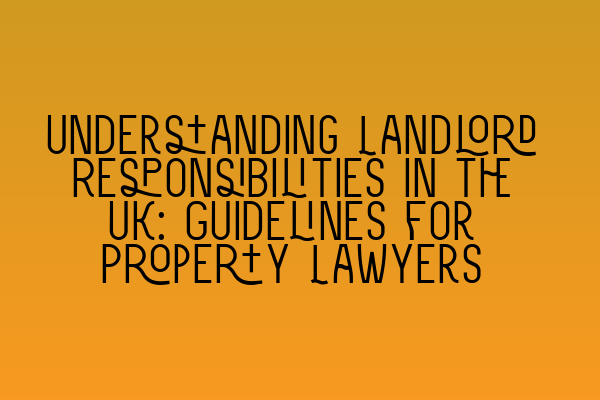Understanding Landlord Responsibilities in the UK: Guidelines for Property Lawyers
As a property lawyer, it is essential to have a comprehensive understanding of the responsibilities that landlords have in the UK. This knowledge is crucial when advising clients on various legal aspects related to property ownership and rental agreements. In this blog post, we will delve into the key responsibilities of landlords, outlining guidelines that property lawyers can follow to ensure compliance with the law and provide the best legal advice to their clients.
1. Assured Shorthold Tenancy (AST) Agreements
One of the most common types of rental agreements in the UK is the Assured Shorthold Tenancy (AST) agreement. It is vital for property lawyers to have a solid understanding of AST agreements, as they set out the rights and responsibilities of both landlords and tenants.
When drafting or reviewing an AST agreement, property lawyers should pay attention to the following key elements:
- Duration: Clearly specify the term of tenancy, including the start and end dates.
- Rent: Outline the amount of rent payable, the frequency of payments, and the method of payment.
- Deposit: Explain how the deposit will be protected and returned at the end of the tenancy in compliance with the relevant legislation.
- Responsibilities: Clearly define the responsibilities of both the landlord and the tenant, such as property maintenance, repairs, and utility bills.
- Termination: Provide clear guidelines on how the tenancy can be terminated by either party and the notice period required.
By ensuring that AST agreements are carefully drafted and reviewed, property lawyers can help their clients avoid potential disputes and legal issues.
2. Health and Safety Obligations
Landlords in the UK have various health and safety obligations that must be met to provide their tenants with safe and habitable accommodation. Property lawyers should be well-versed in these obligations to advise landlords accordingly.
Some key health and safety responsibilities of landlords include:
- Gas Safety: Landlords must ensure that all gas appliances and installations are safe and maintained by a Gas Safe registered engineer. An annual gas safety check should be carried out.
- Electrical Safety: Landlords must ensure that the electrical installations and appliances in their properties are safe and periodically inspected by a qualified electrician.
- Fire Safety: Landlords must comply with fire safety regulations, ensuring the presence of smoke alarms, carbon monoxide alarms, and proper means of escape in case of a fire.
- Furnishings: Any furnishings or furniture provided by the landlord must comply with fire safety regulations and have the appropriate labels.
It is crucial for property lawyers to advise landlords on meeting their health and safety obligations to not only protect their tenants but also avoid potential legal action.
3. Repair and Maintenance
Another significant responsibility of landlords in the UK is to ensure that their rental properties are in a good state of repair and properly maintained. Property lawyers should be familiar with the repair and maintenance obligations to provide accurate advice to their clients.
Landlords must:
- Maintain the structure and exterior: This includes the roof, walls, windows, and external doors.
- Ensure proper sanitation and drainage: Landlords should maintain the plumbing system, sinks, toilets, and drains in good working order.
- Keep the property safe and free from hazards: This includes addressing any safety issues, such as faulty electrical wiring or broken handrails.
- Address repairs promptly: Landlords should address any repairs reported by tenants in a timely manner.
Property lawyers should strongly advise landlords to keep records of repairs and maintenance carried out on their properties. This documentation can provide crucial evidence in case a dispute arises with tenants.
4. Tenancy Deposit Protection
Landlords in the UK are legally required to protect their tenants’ deposits in a government-approved tenancy deposit scheme. Property lawyers need to ensure that their clients are compliant with this obligation to avoid potential penalties and legal issues.
The three government-approved tenancy deposit protection schemes are:
- Deposit Protection Service (DPS)
- MyDeposits
- Tenancy Deposit Scheme (TDS)
Property lawyers should educate their clients about these schemes and guide them on the proper procedures for protecting and returning deposits at the end of the tenancy.
Conclusion
As a property lawyer, understanding the responsibilities of landlords in the UK is vital to provide accurate legal advice and guidance. By having a comprehensive knowledge of assured shorthold tenancy agreements, health and safety obligations, repair and maintenance responsibilities, and tenancy deposit protection schemes, property lawyers can serve their clients effectively while avoiding any potential legal pitfalls or disputes.
For further practice and preparation for the SQE exams, including SQE 1 and SQE 2, explore our SQE 1 Practice Exam Questions and SQE 1 Practice Mocks FLK1 FLK2. We also offer comprehensive SQE 2 Preparation Courses and SQE 1 Preparation Courses. Stay up to date with the latest SRA SQE Exam Dates to plan your preparation effectively.
